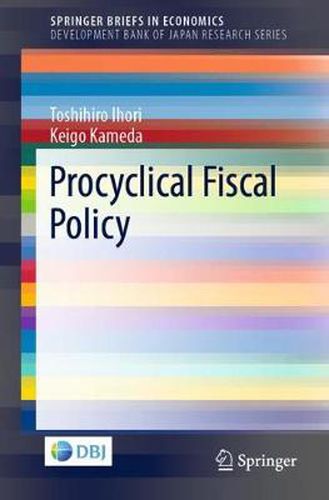Readings Newsletter
Become a Readings Member to make your shopping experience even easier.
Sign in or sign up for free!
You’re not far away from qualifying for FREE standard shipping within Australia
You’ve qualified for FREE standard shipping within Australia
The cart is loading…






This title is printed to order. This book may have been self-published. If so, we cannot guarantee the quality of the content. In the main most books will have gone through the editing process however some may not. We therefore suggest that you be aware of this before ordering this book. If in doubt check either the author or publisher’s details as we are unable to accept any returns unless they are faulty. Please contact us if you have any questions.
Conventional wisdom dictates that a fiscal policy should be counter-cyclical. However, contrary to this conventional views, recent research has demonstrated that fiscal policy is actually procyclical in most developing countries. In this book, we attempt to propose a new interpretation of this procyclicality after reviewing theoretical and empirical evolution of the research. In particular, by incorporating the political effort behavior of private agents into a weak government model, we explore how income fluctuations affect the optimal budget deficits in a political economy. If the government can control the political behavior, normally, the optimal budget deficit should rise in a recession as a first-best case; however, interestingly, a recession does not necessarily prompt an increase in the budget deficits in a second-best political economy. The response of the budget deficits to income fluctuations mainly depends on the efficiency of political effort, which may correspond to the degree of democracy and bureaucratic efficiency of the governments. We test the prediction of the pro-cyclical fiscal policy and find it applicable for democratic countries with semi-efficient governments including Japan.
$9.00 standard shipping within Australia
FREE standard shipping within Australia for orders over $100.00
Express & International shipping calculated at checkout
This title is printed to order. This book may have been self-published. If so, we cannot guarantee the quality of the content. In the main most books will have gone through the editing process however some may not. We therefore suggest that you be aware of this before ordering this book. If in doubt check either the author or publisher’s details as we are unable to accept any returns unless they are faulty. Please contact us if you have any questions.
Conventional wisdom dictates that a fiscal policy should be counter-cyclical. However, contrary to this conventional views, recent research has demonstrated that fiscal policy is actually procyclical in most developing countries. In this book, we attempt to propose a new interpretation of this procyclicality after reviewing theoretical and empirical evolution of the research. In particular, by incorporating the political effort behavior of private agents into a weak government model, we explore how income fluctuations affect the optimal budget deficits in a political economy. If the government can control the political behavior, normally, the optimal budget deficit should rise in a recession as a first-best case; however, interestingly, a recession does not necessarily prompt an increase in the budget deficits in a second-best political economy. The response of the budget deficits to income fluctuations mainly depends on the efficiency of political effort, which may correspond to the degree of democracy and bureaucratic efficiency of the governments. We test the prediction of the pro-cyclical fiscal policy and find it applicable for democratic countries with semi-efficient governments including Japan.